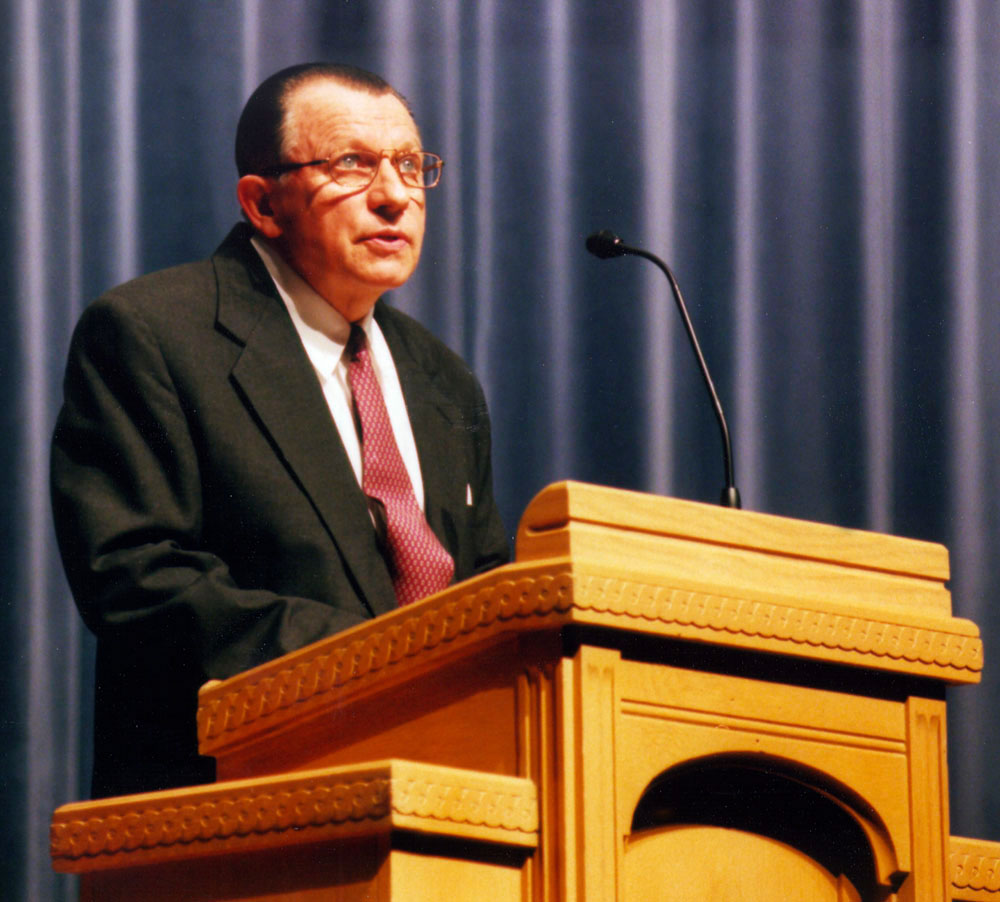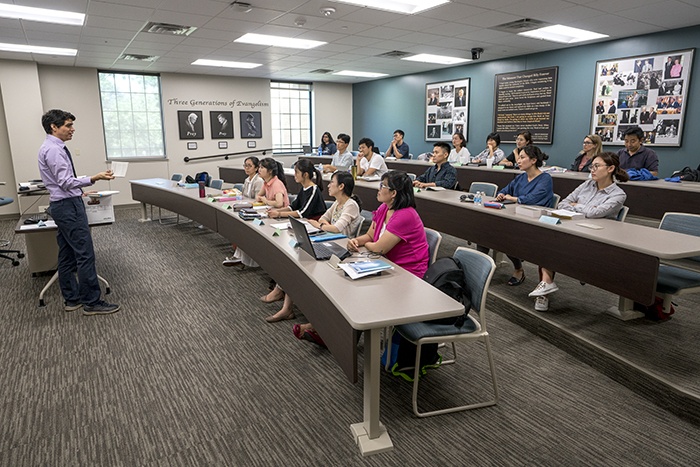
FORT WORTH, Texas (BP)–While the Lord’s Prayer says much about Christians’ attitude toward God, early Christian theologians believed the prayer said much about Christians’ attitudes toward themselves and each other, this year’s Day-Higginbotham lecturer said at Southwestern Baptist Theological Seminary.
Following the opening address of “the most perfect of all prayers,” three petitions focus on the “glory of the Father through the sanctification of his name, through the coming of his kingdom and the doing of his will,” said Peter Toon, executive president of the Prayer Book Society of the Episcopal Church.
The three petitions ask for “both present sanctification and for the speedy coming of the end” and for Christians to “become more Christlike,” Toon said.
Toon made his comments during his lecture series on the debates of 17th-century Baptists and other dissenters regarding the Lord’s Prayer and the prayer’s implications for public worship and on private devotion today.
In his Feb. 8 lecture during chapel at the Fort Worth, Texas, seminary, Toon drew from commentary by Augustine and John Chrysostom as he discussed the opening lines of the Lord’s Prayer.
In the prayer’s opening address, “Our Father,” Toon said, the “our” is not about possession of the Father but about a new relation with the Father through Jesus Christ.
“Jesus the incarnate Son is the Son of God by nature and by right, and we mere mortals are sons of God only by adoption and grace,” Toon said.
Toon added that the pronoun emphasizes the new relationship between Christians as God’s family.
“Even when I pray alone I am praying to ‘Our Father,’ for I do not have a relation to God which is that of an individual to an individual,” but as one who is in a personal relation to fellow children of God, Toon said.
Toon referred to Chrysostom, who explained that Jesus teaches Christians to make their prayers common, because Jesus did not say, “My Father,” but “Our Father.”
Common prayer takes away hatred, quells pride, casts out envy and exterminates the inequality of human beings, Toon said.
Quoting Augustine’s instructions to Christians preparing to be baptized, Toon said, “You have begun to belong to a great family. Under this Father, the lord and the slave are brethren. Under this Father, the general and the common solider are brethren. Under this Father, the rich and the poor are brethren.”
The second phrase, “which art in heaven,” Toon said, indicates God’s abode.
“God the Father is not an inhabitant of this world, and he does not live in space and time as if he were like us,” Toon said. “He is above the creation and outside space and time. His abode is ‘the heaven of heavens.'”
The early church fathers, Toon continued, pointed out that the phrase “which art in heaven” also refers to the souls of the faithful.
Heaven has become Christians’ true home, Toon said, for “heaven is the abode of the redeemed family of God as well as the holy angels.”
While Christians are headed for heaven, Toon said, in some respects they are already there.
“In Christ, [Christians] are actually in heaven. Their citizenship is in heaven. They are seated with Christ in the heavenlies, and God, the Holy Trinity, the Father, the Son and the Holy Ghost, dwells within them as in his temple, ” Toon said.
He noted that Augustine wrote that God is in the hearts of the righteous, and the fathers believed “heaven” also refers to those who bear the image of the heavenly world.
“Hallowed be thy name” seems to be an expression of praise but in reality is a “petition which is a desire and expectation embracing God and man,” Toon said.
This first of three petitions, he said, is a “genuine, prayerful desire that draws believing, adopted children into God’s purpose and plan.”
Augustine taught that this petition is for Christians and not for God, Toon said. Christians do not wish well to God to whom no ill can ever happen, Augustine believed. Instead, Christians should wish that God’s name, which is always holy, would be hallowed in them.
Chrysostom in his exposition of Matthew, Toon said, emphasized that “hallowed” means “glorified” and God’s children are to glorify their Father and his name by the quality and purity of their Christian lives. Chrysostom repeated the words of Jesus: “Let your light so shine before men, that they may see your good works, and glorify your Father, which is in heaven.”
Of the second petition “thy kingdom come,” Toon cited Chrysostom’s comments that it means to long for the things to come, and this longing springs out of a good conscience and soul set free from the things that are upon the earth.
“[The kingdom] has obviously not yet come in its fullness. We actually live in an evil age in mortal bodies affected by sin,” Toon said.
However, he continued, God’s future kingdom will be “the new creation in splendor, full of righteousness and free of all evil and sin and imperfection.”
Only goodness, beauty, glory and peace will be in God’s kingdom, Toon said, and this kingdom will surely come, even without Christian petitions.
Augustine likewise, Toon said, believed that Christians pray this petition for themselves and not for God, because his reign is not dependent on our prayers.
The third petition, “thy will be done on earth as it is in heaven,” is for Christians as well, and not God, who is sovereign and possesses the power to accomplish his plans, Toon said.
The meaning of this petition, according to Augustine, Toon said, “is that may [his will] be done in me, that I may not resist Thy will, for the will of God will be done in thee though it may not be done by thee.”
“In other words, make sure that in your cooperating with the divine grace that the will of God is done by thee, rather than merely in thee,” Toon said.
Chrysostom observed, Toon said, that the petition is not “thy will be done in me or in us,” but that God’s will be done everywhere in the “earth” so that error may be destroyed, truth implanted, all wickedness cast out, virtue returned and no difference in this respect henceforth between heaven and earth.
The Day-Higginbotham Lectures were established in 1965 in honor of Paul Higginbotham, a Fort Worth businessman, and Mr. and Mrs. Riley Day, parents of Mrs. Edwin Reardon III, who established the fund. The lectures are presented annually by a scholar in a theologically related discipline or current interest.
–30–
(BP) photo posted in the BP Photo Library at https://www.bpnews.net. Photo title: PETER TOON.


















